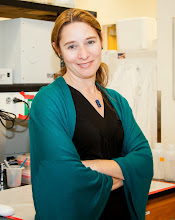Speaking about Science...the blog about how to communicate scientific concepts to the public, and to other scientists, and about why we should care.
About Me

- Allison Coffin, PhD, DTM
- I'm an assistant professor of neuroscience at Washington State University in Vancouver, where I use tiny zebrafish (the size of an eyelash!) as a model system to study human hearing loss and how we can prevent it. I'm also a long-time Toastmaster and I teach communication workshops. This blog represents the merging of my two passions - science and communication, which has really become one central passion - the science of communication. There's a revolution in science right now...the idea that we scientists should sometimes leave the lab and talk about what we do, and why we do it, to real people. This blog looks at why we should do this, and how to actually talk about science with non-scientists (and with each other!). Portions of this blog are also featured on Qualia, the AAAS MemberCenter blog site.
Monday, February 3, 2014
Communicatalyst has moved!
I've migrated to a site with more functionality. Communicatalyst.com is on it's way to becoming a real science communication website! Please update your bookmark and I'll see you on the new site.
Wednesday, January 22, 2014
January 27th communication event!
Want to improve your communication and leadership skills? Toastmasters can help! The local Salmon Creek Toastmasters club is holding an open house on Monday, January 27th at 7 PM at the Salmon Creek Burgerville. Stop by to see how Toastmasters can help you reach your professional and personal goals!
Guests are welcome any Monday, not just this week. For those outside the Vancouver area, check the Toastmasters International website to locate a club near you.
Guests are welcome any Monday, not just this week. For those outside the Vancouver area, check the Toastmasters International website to locate a club near you.
Thursday, January 2, 2014
The 4th C
 |
| by Andrea for http://www.clker.com |
Last post I mentioned the 3 C’s of communication: content,
clarity, and charisma. It turns
out there’s a fourth C: coat.
At the morning competition for FameLab San Francisco, one
contestant chose to wear his coat while he delivered his speech. It was a nice coat – new, neutral
color, and very stylish. But when
it came time for his evaluation, the judges focused on the coat more than his
content. The take-home message?
What we look like – our clothing, accessories, and overall appearance –
makes a difference. In this case,
one judge was so incensed about the coat that she could barely remember the
message!
As scientists, we often concentrate on presenting our data…did
we get the facts right, and remember to make a particular point? This is all important, but our public
face – what we look like – matters too. For a conference talk, that probably
means a tailored shirt and slacks (or a business suit - any M.D.s out
there?). For young women, I highly
recommend pants rather than a skirt.
Most of us want the audience to remember our message, not our legs, not
matter how great they look! For a public talk in a bar (think Science on Tap),
I usually opt for something more causal, like jeans and a blazer. I want to look professional yet
comfortable, and not out of place.
For a talk at a school I’ll break my “no skirt” rule, showing the girls
that they can be scientists and still look good in a skirt and boots!
What’s your favorite talk attire? Whatever your look, let
the audience focus on your message, not your clothes…and leave the coat at
home.
Subscribe to:
Comments (Atom)